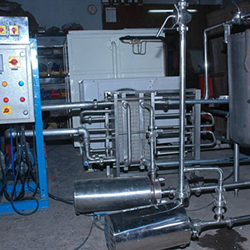Code : MDP

Our mini dairy plants comprise of following parts :
- HTST / Batch - Pasteurizer – 250LPH expandable to 500LPH
- Refrigeration System for same
- Pouch Filling Machine
- Butter Churn
- Cream Separator
- Manual Yoghurt Filling Machine
- Milk Analyzer
- Spares, Piping, SS Pump, etc.
The dairy business in Kenya has grown and changed significantly over the past century, beginning in the early 1900s when the first exotic dairy cattle were brought into the nation and the first veterinary services department was founded. The colonial farmers who built substantial farms served as the industry's cornerstone. The industry was founded by colonial farmers who constructed large-scale dairy farms and sold their products through a single corporation, with Africans not being allowed to engage in commercial dairying. The Kenya Dairy Board (KDB) was created in 1958 with the goal of organising, promoting, and controlling the dairy industry and its products. Native Kenyans began getting more and more active in dairy farming at this era. With an anticipated 7% growth rate, Kenya currently has one of the most developed dairy sub-sectors in Sub-Saharan Africa. Kenya produces 5.2 billion litres of milk yearly, ranking third behind Ethiopia and Sudan. It also has the greatest per capita consumption in Africa, at 120 litres, compared to the continent's average of 50 litres, but way below the globally recommended 250 liters.
A dairy business in Kenya is a profitable one. The country has a large dairy industry and an abundance of dairy products. Dairy products are used in many foods, including yogurt, cheese, ice cream, and ice cream sundaes. Dairy products are also used in desserts such as cheesecake and cookies. In addition to being a profitable business, dairy businesses in Kenya are also well-educated. Many people are educated about the use of dairy products and the benefits of dairy farming.
Dairy farming is also a good way for people to earn money if they want to make extra money from their jobs. People can earn money by selling milk to restaurants or farmers markets. They can also sell milk to other businesses that need milk.
Dairy farming also provides people with an opportunity to make extra money from their jobs by selling milk on the side. This can be particularly useful for people who want to make extra money from their jobs but don’t have enough money to buy food or rent a place to live.

